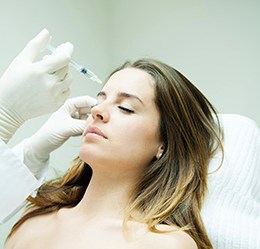Australians spend $1 billion annually on appearance medicine – and at the current rate of industry growth, that figure is likely to surge as people prepare to face another year at work and play.
“Whether it’s the desire to defy nature by looking refreshed instead of washed out at the beginning of another year or a plan to return to work looking younger, it’s around now that we, as cosmetic surgery and medical practitioners [and purveyors of those services – for instance, a salon spa or clinic that brings in cosmetic injectors at regular interval on a contract basis], need to be especially on top of our game,” urges Dr Ron Bezic, President of the Australasian College of Cosmetic Surgery (ACCS).
“Safety, quality and discernment are essential for both the practitioner and the patient.
“We have a responsibility to prospective patients to firstly listen, and then assess, discuss and discern what will best deliver the desired outcome for a healthy person. And being discerning means we sometimes turn prospective patients away.
“Cosmetic surgery and medicine is an art that requires our attention and a commitment to ongoing education.
“We must also be dedicated to responsibly guiding patients towards making an informed choice.
“A good outcome in a cosmetic procedure begins in the consultation process. It’s ultimately a very personal experience and one that requires careful assessment.
“All cosmetic surgery carries risks and the perceived physical and psychological benefits need to be considered without external pressure or inducements.
“Gift vouchers and time-sensitive discounts which can seduce people to have cosmetic surgery or other medical treatments, is inappropriate.”
These time-limited discounts are expressly prohibited by the ACCS Code of Practice and the Medical Board of Australia’s advertising guidelines.
As part of its Code of Practice, the ACCS has also produced a patient information brochure, Things You Should Know, about how to choose a doctor and questions to ask before deciding to have a cosmetic medical procedure. The Code of Practice and patient information brochure are available from ACCS.ORG.AU.
Dr Bezic further offers this advice to people considering a cosmetic medical procedure:
- When looking for a cosmetic medical or surgical practitioner, look for the ACCS Seal and Code of Practice Seal.
- Ask your doctor: What is your training? How many times have you performed this procedure before and in the last year?
- What are the risks with this procedure and what is your own complication rate?
- What are the alternatives to the procedure being considered?
- Can I see results of your patients who looked similar to me before their surgery?
- Ask yourself: Do I feel confident with this doctor? Do I feel confident about having this procedure? Have all my questions been answered satisfactorily? Am I happy with all of the arrangements that have been made for me? Do I understand the risks and potential complications of this procedure?
DON’T:
- Rush a decision on cosmetic surgery
- Be seduced by a discount offer for cosmetic surgery or cosmetic tourism. Cosmetic surgery tourism is a discount, cost-driven business, which often uses commission-driven or otherwise paid agents as well as discounted holiday packages to lure consumers. The College considers these approaches to be contrary to good medical practice and to the ACCS’s Code of Practice, Commonwealth laws and ethical-professional guidelines.
ABOUT THE ACCS
The primary goal of the ACCS is to ensure the safe provision of cosmetic medicine and cosmetic surgical procedures to the Australian community through the supply of appropriately trained and certified health care practitioners. Established in 1999, the ACCS is a not-for-profit, multi-disciplinary fellowship-based college of general surgeons, cosmetic surgeons, plastic surgeons, maxillofacial surgeons, cosmetic physicians, dermatologists, ear nose and throat surgeons, ophthalmologists, general practitioners and other doctors who practice in cosmetic medicine and surgery. The College also admits nurses as affiliate members. The ACCS is the only medical college which provides education and training leading to fellowship specifically in cosmetic medicine and surgery. Fellows of the College are medical doctors who have completed post-graduate education and training and have demonstrated competency specifically in cosmetic medicine and surgery. To become an ACCS Fellow, doctors must typically complete a minimum 12 years medical and/or surgical education and training.




